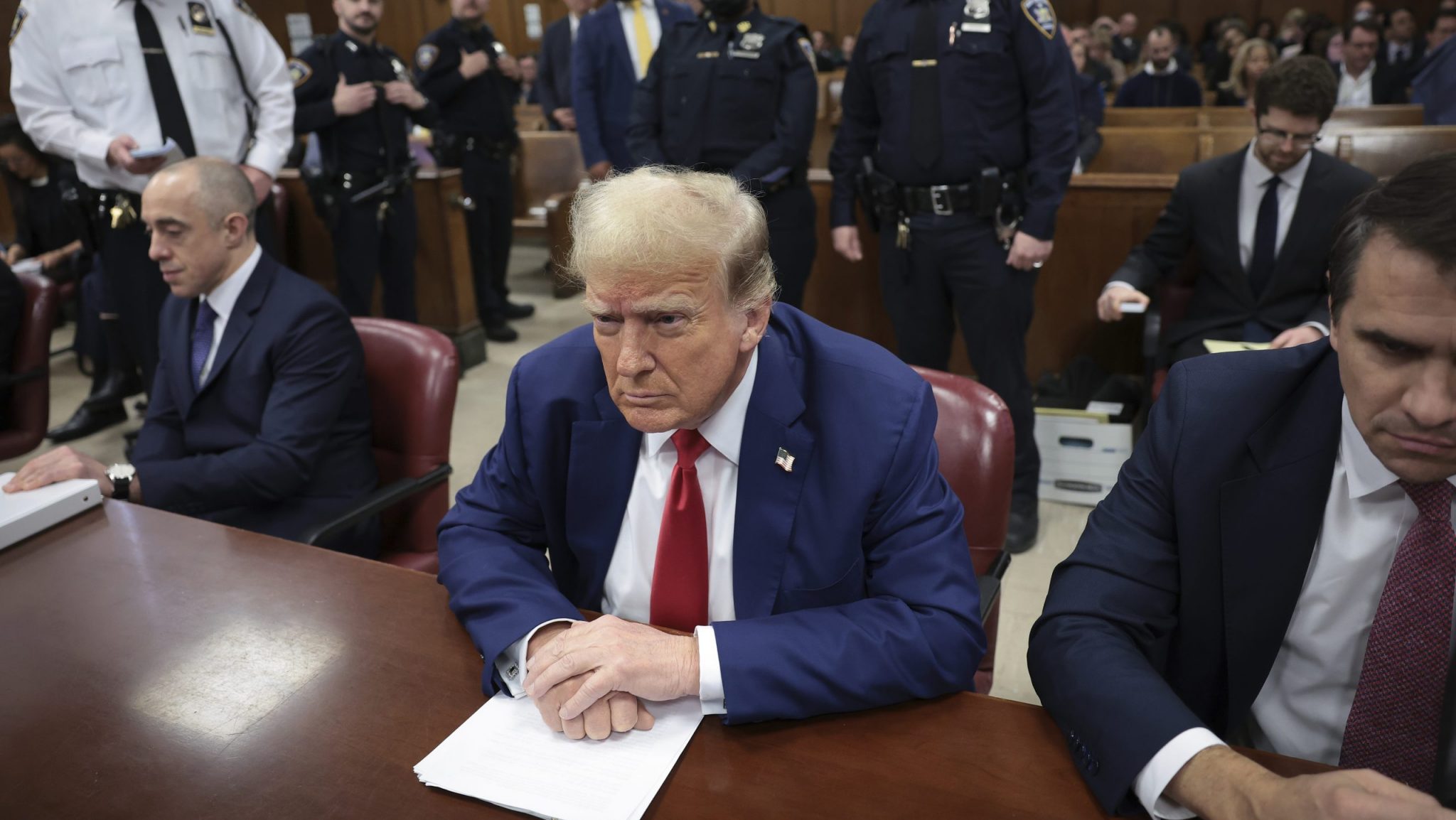Trump fined $1,000 for gag order violation in hush money case as judge warns of possible jail time
Associated Press May 6, 2024The fine marks the second time since the trial began last month that Trump has been sanctioned for violating the gag order.

Former President Donald Trump attends his trial at the Manhattan Criminal court, Monday, May 6, 2024, in New York.
NEW YORK (AP) — The judge presiding over Donald Trump’s hush money trial fined him $1,000 on Monday for violating his gag order once again and sternly warned the former president that additional violations could result in jail time.
The fine marks the second time since the trial began last month that Trump has been sanctioned for violating the gag order, which bars him from making incendiary comments about jurors, witnesses and other people closely connected to the case. He was fined $9,000 last week, $1,000 for each of nine violations.
“It appears that the $1,000 fines are not serving as a deterrent. Therefore going forward, this court will have to consider a jail sanction,” Judge Juan M. Merchan said before jurors were brought into the courtroom. Trump’s statements, the judge added, “threaten to interfere with the fair administration of justice and constitute a direct attack on the rule of law. I cannot allow that to continue.”
The violation in this case stems from an April 22 interview with television channel Real America’s Voice in which Trump criticized the speed at which the jury was picked and claimed it was stacked with Democrats.
“That jury was picked so fast — 95% Democrats,” Trump said at the time. “The area’s mostly all Democrat. You think of it as a, just a purely Democrat area. It’s a very unfair situation that I can tell you.”
Trump sat forward in his seat, glowering at the judge as he handed down the ruling. When the judge finished speaking, Trump shook his head twice and crossed his arms.
Yet even as Merchan warned of jail time in his most pointed and direct admonition, he also made clear his reservations about a step that he described as a “last resort.”
“The last thing I want to do is put you in jail,” Merchan said. “You are the former president of the United States and possibly the next president as well. There are many reasons why incarceration is truly a last resort for me. To take that step would be disruptive to these proceedings.”
Meanwhile, testimony resumed Monday with prosecutors calling to the stand Jeffrey McConney, the former Trump Organization controller.
He retired from the company last year after 36 years after being granted immunity to testify for the prosecution at the Trump Organization’s New York criminal tax fraud trial, where he admitted breaking the law to help fellow executives avoid taxes on company-paid perks. The company was convicted and is appealing.
The testimony follows an inside-the-room account given to jurors Friday about Trump’s reaction to a politically damaging recording that surfaced in the final weeks of the 2016 campaign.
Hope Hicks, a former White House official and for years a top aide, was by far the closest Trump associate to have taken the witness stand in the Manhattan trial.
Her testimony was designed to give jurors an insider’s view of a chaotic and pivotal stretch in the campaign, when a 2005 recording showing Trump talking about grabbing women sexually without their permission was made public and when he and his allies sought to prevent the release of other potentially embarrassing stories.
That effort, prosecutors say, included hush money payments to a porn actor and Playboy model who both have said they had sexual encounters with Trump before he entered politics.
“I had a good sense to believe this was going to be a massive story and that it was going to dominate the news cycle for the next several days,” Hicks said of the “Access Hollywood” recording, first revealed in an October 2016 Washington Post story. “This was a damaging development.”
The trial entered its third week of testimony Monday with prosecutors building toward their star witness, Michael Cohen, Trump’s former lawyer and personal fixer who pleaded guilty to federal charges related to the hush money payments. Cohen is expected to undergo a bruising cross-examination from defense attorneys seeking to undermine his credibility with jurors.
Trump faces 34 felony counts of falsifying business records in connection with payments made to stifle potentially embarrassing stories. Prosecutors say Trump’s company, the Trump Organization, reimbursed Cohen for payments to porn actor Stormy Daniels and gave Cohen bonuses and extra payments. Prosecutors allege that those transactions were falsely logged in company records as legal expenses.
Trump has pleaded not guilty and denied sexual encounters with any of the women, as well as any wrongdoing.
So far, jurors have heard from witnesses including a tabloid magazine publisher and Trump friend who bought the rights to several sordid tales about Trump to prevent them from coming out and a Los Angeles lawyer who negotiated hush money deals on behalf of both Daniels and Playboy model Karen McDougal.
Trump’s lawyers have tried to chip away at the prosecution’s theory of the case and the credibility of some witnesses. They’ve raised questions during cross-examinations about whether Trump was possibly a target of extortion, forced to arrange payouts to suppress harmful stories and spare his family embarrassment and pain. Prosecutors maintain the payments were about preserving his political viability as he sought the presidency.
The case is one of four Trump prosecutions and possibly the only one that will reach trial before the November election. Other felony indictments charge him with plotting to subvert the 2020 presidential election after he lost to Democrat Joe Biden and illegally hoarding classified documents after he left the White House.
By Michael R. Sisak, Jennifer Peltz, Eric Tucker and Jake Offenhartz, Associated Press
